On paper at least the Welsh language has come a long way in the last 60 years. In the 1950s and 1960s the language had no official status; apart from tombstones in chapel cemeteries it was all but invisible in public, and Welsh speakers had no rights. Small wonder that so many people drifted away from a language which they were told had no future and nothing to offer their children. English was the key to a more prosperous life; English was progress.
The first stirrings of a change in attitudes among Welsh speakers can be traced back to the village of Llangennech in the 1950s where Eileen and Trevor Beasley decided to ask Llanelli Rural District Council if they could receive their rates bill in Welsh. The council, whose staff were almost all Welsh speaking, served an area which was still overwhelmingly Welsh-speaking. It refused the Beasleys’ modest request and dug its heels in. In the years that followed, the couple were taken to court on 16 occasions, and many of their possessions were confiscated by bailiffs who carted off the family piano, wedding presents and anything else which was deemed to be of value.
After eight years and at huge personal cost, the Beasleys eventually won their battle with dignity, and Eileen has often been compared to Rosa Parks whose refusal to give up her whites only seat on a bus was one of the events which triggered the US civil rights movement and the battle to end segregation.
Eileen and Rosa may have won their battles, but hostility towards the Welsh language in Wales and black people in the United States remain deeply ingrained in officialdom and sections of the public. “Black lives matter” is so evidently true that the shocking thing is that it even needs to be said.
If proof were needed that prejudice and bigotry are alive and well, the BBC this week broadcast an edition of its Week In Week Out programme which happily trotted out the old myth that the Welsh language is expensive and irrelevant.
Ahead of the broadcast, the BBC was forced to remove statements based on false calculations of the cost to local authorities of complying with the new Welsh language standards regulations. In response to complaints, the BBC issued a half-hearted apology saying that the “data was not robust”.
The broadcast nevertheless went ahead, and viewers were served up with a depressingly familiar one-sided diatribe against the Welsh language, including a claim that having to employ staff on reception desks who can speak Welsh would double the number of staff needed, presumably because a Welsh speaking receptionist would be incapable of dealing with people speaking English.
Week In Week Out spent a lot of trundling around Torfaen and Merthyr Tydfil asking locals what they thought about their councils being forced to spend millions of pounds on the Welsh language, but the programme also managed to squeeze in a cameo appearance from Michaela Beddows who is one of the leaders of a campaign to save the children of Llangennech from the evils of Welsh medium education.
Back to Llangennech
The row about the infant and junior schools in Llangennech has been rumbling on for almost six months now. The proposal, backed by the governors and the county council, is to merge the two schools and create a single Welsh medium primary on the same site to serve the village. The English stream would be phased out, but children whose parents opted for English medium education would continue to be taught through English until they complete their time in the school. After that, parents who do not want their children to be taught through the medium of Welsh would take their children to other English medium primaries close by, of which there are several.
According to the 2011 census, 39.9% of the population of Llangennech ward, which extends beyond the village, were Welsh-speaking, and the junior school’s Welsh stream has been proving to be very popular. 73% of the children attending the infant and junior schools are in the Welsh stream, with just 27% receiving their education through the medium of English. Also, contrary to claims made by opponents of the scheme, 75% of the children in the school are from its catchment area.
The proposal to phase out the English stream went to public consultation, with representations from parents and others who were both for and against the change. Parents who cannot speak Welsh and who have never mastered another language apart from English will understandably have questions and concerns about Welsh medium education.
Will my child cope? Will their English suffer? What help is available?
Inevitably, parents facing change tend to see themselves and their children in isolation, but they are by no means the first to switch to Welsh medium. Councils and the government could do a lot more to explain the advantages, and to share the experiences of schools which have phased out English medium.
There is overwhelming evidence that being able to function in more than one language gives children many advantages, including improved cognitive and communication skills. Children with more than one language tend to be more creative when processing information; they learn new languages more easily; are better at multi-tasking, listening and problem solving; and they also outperform children in spatial working memory tasks, such as performing complicated mathematical problems using short-term working memory.
Unlike the 1950s, there are now also many more well-paid jobs and career paths open to Welsh speakers.
Put simply, a Welsh medium education, while it does not come with guarantees, will give your child skills and more choices later in life, and that is why there is growing demand for Welsh medium education, including secondary education in areas where the percentages of those able to speak the language are far, far lower than in Llangennech. In Torfaen, which featured so heavily on Week In Week Out, there is Ysgol Gyfun Gwynllyw, and Newport is about to get its first ever Welsh medium secondary school, to name but two.
In Carmarthenshire, the county council adopted a new Welsh language strategy a couple of years ago, part of which involves moving its schools along the so-called language continuum to increase the provision of Welsh medium education. This is in line with government policy, and was supported by 73 of the council’s 74 councillors, including the unanimous backing of the Labour group.
The problems start when policy is put into practice. Some parents back change, recognising the benefits for their children and the wider community. Others may have concerns, but are open to reason and persuasion. And then there is always a hard core who reject Welsh medium education for their children, stick their fingers in their ears and yell about freedom of choice while denying their children the choices which bilingual children have.
Inevitably, these campaigns always attract the attentions of political opportunists, nasties and nutters, and that is exactly what has happened in Llangennech where a small hard core of objectors has been conducting a campaign which has descended into bullying, intimidation and abuse, with various interlopers enthusiastically fanning the flames.
Apartheid
One of those who shipped up outside the school gates was Father John Plessis, the local Anglican vicar, dressed up like an old-fashioned Catholic priest in an ankle length cassock with silk buttons and a should-length cape.
Father Plessis has come to Llangennech from the north of Ireland via South Africa. Talking to the Llanelli Herald, he held up a placard with quotes from the Bible, and explained why in his view the plans were nothing less than apartheid and segregation. Judging by his placard, Father John’s god would appear to be an English monoglot.
Just how phasing out a dual stream English/Welsh system, and replacing it with a school in which children are not separated on the basis of language constitutes apartheid is a question the interviewer should perhaps have put to the cleric.
One of the most vocal objectors is Michaela Beddows, who it will be remembered popped up on Week In Week Out. Beddows says she is concerned about the impact on children with learning disabilities. She is the mother of a 15 year-old child who, funnily enough, no longer attends the primary school, but that is not going to stop her campaigning to deny Welsh medium education for other children in the school, and she has vowed to fight to the bitter end.
Beddows was one of the ringleaders of a group which organised a march by objectors into the school to harangue the school governors who had called a meeting to discuss the plans with parents. Unsurprisingly, parents who took a different view felt it wise to stay away from the event.
Calpolgate
Taking time off from yelling at staff and governors of the school, Beddows recently told her followers on Facebook of a run-in she had had with staff at her local Morrisons. After her son complained of earache, she went on a shopping spree and loaded her trolley up with goodies including Ibuprofen and two different products containing paracetamol.
The poor woman at the checkout had to inform La Beddows of rules restricting the bulk purchase of medicines, and that she could only buy two of the three. Beddows insisted on calling over the supervisor before venting her spleen on the store’s customer services and the store manager, all of whom she vilifies on her Facebook page.
Thanks to these jobsworths, she declares, “two pretty sick children will not be getting their medicine tonight”, before storming off, vowing never to shop in Morrisons again. The staff can breathe a sigh of relief.
The Spanish Civil War comes to Llangennech
It will come as no surprise to readers of Jac o’ the North to know that one of Beddows’ buddies on Facebook is local Labour community councillor, Gary Robert Jones, aka Poumista, who seems to spend most of his waking hours on Twitter, and Jones has been assiduously fanning the flames in Llangennech.
As readers may also recall, one of Jones’s best buddies is Labour’s human megaphone, Rosemary Emery, who declared on this blog that, “compulsory education solely through the medium of Welsh for all at this time does smack of facism”.
Emery’s CV includes a stint as researcher for Keith ‘Chardonnay’ Davies, the previous Labour Assembly Member for Llanelli, and she is now busy beating the PR drum for Lee Waters.
It is becoming increasingly clear that Poumista Jones and Megamouth Emery see the future of the primary school as a political opportunity, and the question is to what extent their activities have been sanctioned higher up.
Davies was something of a Welsh language mascot for Labour, while Waters appears to be more ambivalent while keeping his hands clean of all the nasty stuff.
A Broad Church
Llanelli Labour’s tactics of being all things to all men (and women) were on public display last week when Carmarthenshire County Council’s Education and Children’s Scrutiny Committee met to consider the next steps in the plans for primary education in Llangennech.
Labour has three members on the committee, and two of those did not turn up, despite being advertised as “expected to attend” on the council’s website. Their places were taken at short notice by the group leader, the lugubrious Jeff Edmunds, and Eryl Jones, a non-entity who was catapulted into chairmanship of the council this year in a manoeuvre designed to keep out a more deserving candidate who had displeased inhabitants of the vipers’ nest.
Edmunds acknowledged that Labour had supported the policy adopted by the council (Labour was actually in charge at the time, he might have added), but he felt uncomfortable applying it in the case of an individual school. Clearly Edmunds had thought that the policy was meant to be window dressing only.
When the matter was taken to a vote, Edmunds and his colleagues decided that the best course was to abstain.
Meanwhile, opponents of Welsh medium education in Llangennech have formed themselves into a committee and set up a website, Keep Llangennech Primary Dual Stream.
Although the self-appointed committee protests that it isn’t against Welsh medium education, the mask slips on the website. Here, various anonymous articles inveigh against the evils of Welsh medium education, the governors, Gwyn Hopkins (the local Plaid councillor) and just about anyone else who disagrees with them.
Most of the writers, who are clearly proud of what English medium education did for them, do not appear to have paid much attention in English lessons. Here are a few of the gems:
Currently English stream children have been upset to be not allowed to be sung happy birthday to them in English as must be Welsh only.
Some parents worry that if the levels of Welsh increases further within the school it will affect pupils currently in the English Stream regardless that it stated that they will finish their education technically within an English stream as the level of Welsh has increase year on year already.
Currently English stream children have been apologising to their parents as arts and crafts projects in school such as Easter Cards have had to be written in Welsh only and pupils feel bad their parents can’t read what they have written.
It must be very traumatic to be faced with the words “Pasg Hapus”, and you have to feel sorry for the kids who have to apologise and spell things out for their dumb parents.
The latest contribution was written in the wake of the Scrutiny Committee meeting where the Director of Education had ‘revealed’, shock horror, that children in the reception classes were being taught in Welsh.
This has been the case for years, and is standard practice in dual stream schools, where parents are asked to choose between the Welsh and English streams when their children are aged 7.
The outrage felt by objectors raises the question of just how much interest they actually take in the education of their offspring, because clearly they had not noticed that their children were being taught in Welsh:
Another dark grey cloud called “lack of integrity” blows over and settles firmly above the roof of Llangennech School this morning. It was during the Education & Children Scrutiny Committee in Carmarthen on the 23rd May, where discussions were being made about the controversial proposed change of language category for Llangennech school from Dual Stream to Welsh Medium, where Rob Sully the Director of Education & Children and Gareth Morgans Head of Education Services confirmed to parents of pupils in the school for the first time ever that Derbyn 1 and Derbyn 2 were not currently bilingual classes and in fact they are Welsh Medium classes already.
The rant continues with attacks on the school staff and accusations of lying and corruption, finally ending with a threat that parents will up sticks and take their children to Swansea:
However the corruption surrounding this school is now driving many parents in search for other avenues to educate their children, some looking at home-schooling others are considering the likes of Pontarddulais school so to come under Swansea Council area, removing their children from illegal enforcement of the Welsh Language and Lies.
Responding to this and other online abuse, Gareth Jones, the council’s Board Member for Education, on Friday released the following statement:
Unfortunately for everyone concerned, the battle still has a very long way to go. The Scrutiny Committee met to consider the outcome of a statutory public consultation. Their recommendations will now go forward to the council’s Executive Board. If the proposal is approved there, there will be a second and near-identical consultation beginning in September, with another, near-identical report from the education department.
The report will then return to the Scrutiny Committee, which will pass it on to the Executive Board, which will pass its decision on to the full council for ratification some time in 2017.
If the aim of this process had been to prolong uncertainty and encourage bitter battles, the civil service which devised it could not have done a better job, and reform of the statutory consultation process must now be a priority.
In the meantime, the council must hold its nerve, and Carwyn Jones, Lee Waters and others need to read the Riot Act to their supporters.
UPDATE 31.05.2016: An interesting new post has appeared on the website run by objectors to plans to create a new Welsh medium primary school in Llangennech. It is in response to a statement put out by the county council deploring personal attacks on members of school staff being circulated on social media, and firmly rejecting allegations made by the objectors that the school has been acting illegally in its use of Welsh in reception classes.
In something of an own goal, the article includes an image of an article which has appeared in the Llanelli Herald describing how the objectors’ committee circulated a very long ‘press release’ (inverted commas applied by the newspaper) to a number of media outlets repeating the allegations.

The Herald notes that the objectors managed to misspell the name of the village they claim to represent, and asks why parents who should be closely involved in monitoring their own children’s progress and education, failed to spot or complain about language provision in reception classes, even though they claim that this “illegal” teaching has been going on for five years.
Could it be that the reading age of these proud products of English medium education wasn’t up to understanding the Herald article?
~ ~ ~ ~ ~ ~ ~ ~ ~ ~ END ~ ~ ~ ~ ~ ~ ~ ~ ~ ~
JAC COMMENTS . . .
We’ve been here before; an assortment of oddballs and bigots shrieking about ‘discrimination’ and ‘oppression’ – even ‘apartheid’! – having been stirred up by ‘Welsh’ Labour hoping to blame it all on ‘intolerant’ nashies and then reap the political dividend.
The Reverend Dr Plessis
The ‘apartheid’ slander came from a man wearing a full-length clerical habit who wasn’t on his way to a stag night. The Reverend Dr John K Plessis is an Ulster Protestant who has washed up in Llanelli via South Africa, Reading, Haverfordwest, Cardiff, Swansea and God knows where else, and is a clergyman in the Church in Wales.
Perhaps his Six Counties origins have conditioned him against the language of the indigenous population to the extent that he regards Welsh as a threat to his ‘British heritage’ (a much-loved term among Ulster Loyalists).
I’m surprised by Plessis’ behaviour because the duty of the Church is surely to bring people together, but Plessis has taken sides, and accuses others of being divisive, while seeing nothing divisive in his own behaviour. (What does the Good Book say of motes and beams?)
But then, I suppose he might be representative of the Anglo-Catholic wing of the English national Church, though were I his bishop I’d be inclined to help this rootless individual keep moving.
‘Thou hypocrite’, indeed.
Michaela Beddows
I don’t know much about Michaela Beddows beyond what she’s told me herself, on her Facebook page, for which I am indebted to our guest writer and the link provided. But in case that post has been removed by the time you read this, I’ve saved it for you here.
Those who did not submit to Beddows in the ‘Calpolgate’ episode at Morrisons are described thus: ” . . . the checkout operator was a complete and utter jobsworth, no personality and pretty gormless, the Till Manager was arrogant, cocky and downright rude, obviously being a till manager has gone to her pretty vacant head – and the Manager of the store was a bumbling buffoon who should grow a pair of balls”.
‘Unhelpful’ or ‘incompetent’ are clearly inadequate descriptions, Beddows has to be very personal and insulting to people she doesn’t know. Which says much more about Michaela Beddows than it could ever tell us about those she thinks she’s describing.
Though the encounter with the “arrogant, cocky and downright rude” till manager might have been mildly disconcerting for her, one of those ‘doppelgänger moments’. Like looking in a mirror.
Being a student of modern English usage I was also struck by a phrase she used earlier in her diatribe. It reads, “I wasn’t happy that my daughter had also come in from school complaining of ear and throat ache”. ‘I wasn’t happy’, or ‘I’m not happy’ invariably means that the person using the phrase is annoyed with someone or something. (And who else had come in from school complaining of ear and throat ache?)
So who was Beddows annoyed with for her daughter’s ear and throat ache? If I had to guess, it would be the school, or the teachers. I say that because Michaela Beddows is obviously a ‘shouty’ sort of woman who’s in love with the sound of her own voice, while being blind to her own shortcomings, one who takes pleasure in putting people down.
In short, a bully, and just the sort of person I’d expect to find prominent in a campaign of blind bigotry.
Jones the Stirrer
Regular readers with recall – with unbridled joy, I’m sure – that in a recent post I wrote of Gary Robert Jones, and Rosemary Emery, comrades in the ongoing struggle against the encroaching forces of darkness.
Jones is a Labour community councillor in Llangennech, and takes his wit and wisdom to a wider world via his Twitter account @Poumista, the name taken from a Spanish Communist Party active during the Civil war. He has been seen at recent gatherings of the protesters energising the mob.
Hardly Napoleon addressing the Old Guard, more like some malodorous commissar spewing bullshit to keep the comrades motivated. But as our guest writer wonders, how far up the ‘Welsh’ Labour food chain does approval for this campaign reach?
Seeing as Jones is clearly given free rein by his superiors we must assume that he has their blessing, perhaps even their encouragement, because ‘Welsh’ Labour shares Joe Stalin’s attitudes towards independence of thought or action.
‘Penyfai’
I shall end with another priceless example of the sort of people who support the anti-Welsh campaign in Llangennech. Here’s a gem gleaned from this article in the Evening Post of May 23rd.
Rarely do we encounter such a brief message that says so much. ‘Penyfai’ is opposed to “monolingualism” . . . and there was me thinking that the teaching of Welsh was leading us towards a bilingual Wales.
And yet, with his / her attitude towards the Welsh language, ‘Penyfai’ is surely advocating monolingualism in Wales?
The most revealing bit though is where ‘Penyfai’ says that unless “Cymraeg coercion” is ended he / she “will refuse to buy any Welsh produce in future”. That’s telling ’em . . . until you start to wonder what Pwllheli rock, or Penclawdd cockles, Brains beer or Welsh lamb, etc., etc., have to do with a school dispute on the outskirts of Llanelli.
‘Penyfai’, like all bigots, would, I’m sure, want others to follow his / her example – and put tens of thousands of Welsh people out of work! What an absolute arsehole!!! I wonder what Plessis, Beddows and Jones have to say about their comrade in arms ‘Penyfai’? . . . but then, maybe one of them is ‘Penyfai’.
Whoever it is, this cretin serves to bring home the message that for many of those involved in the Llangennech dispute – and those outside the area who support them – this is not simply about teaching in a particular school, or even about the Welsh language, at bottom this is an attack on everything Welsh.
Fitting, then, that it should be orchestrated by anti-Welsh Labour, acting true to form. The repulsive George Thomas must be looking up approvingly from his final resting place.
P.S. My take on the update added to the end of the guest piece is as follows. I believe the parents knew their children were being educated in Welsh – they must have! Which means that the semi-literate ‘press release’ was issued by a person or persons not directly concerned. Which supports another theory – that this ‘campaign’, if not launched by persons not directly involved, has certainly been hijacked by such people. Which in turn suggests that the website and indeed the campaign is now controlled by people who just want to put the boot into the Welsh language, and are simply exploiting the parents, and of course, the children.
UPDATE 03.06.2015:



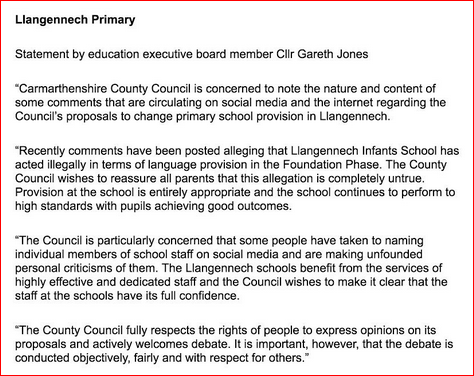
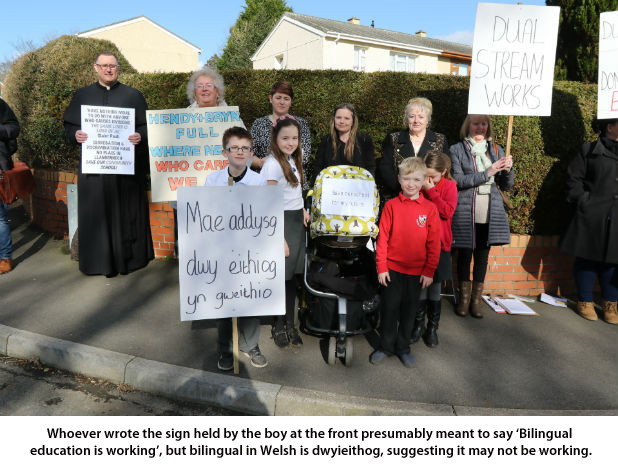


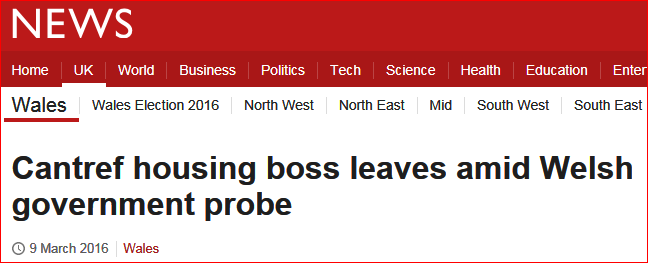

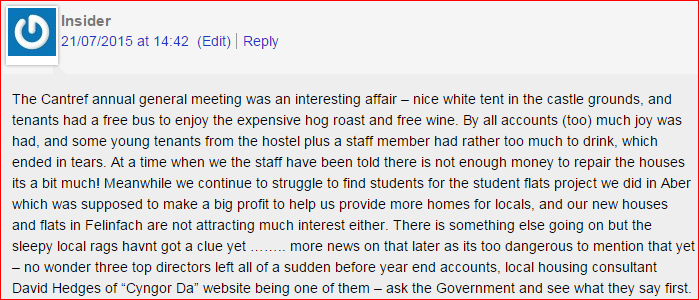

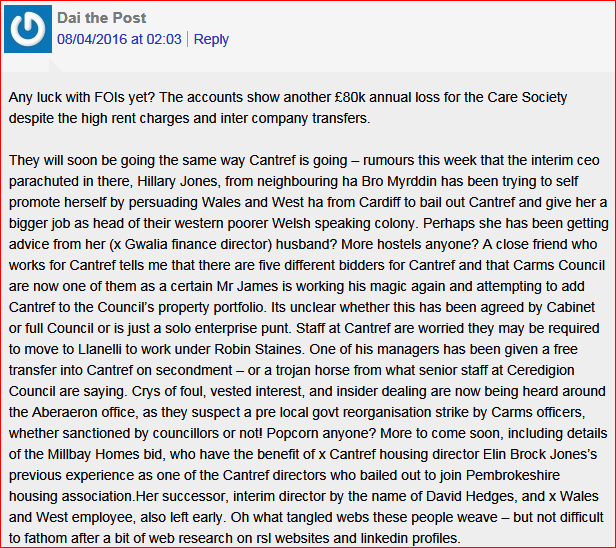
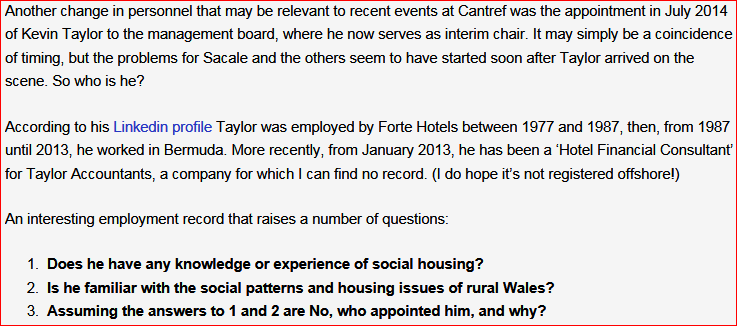

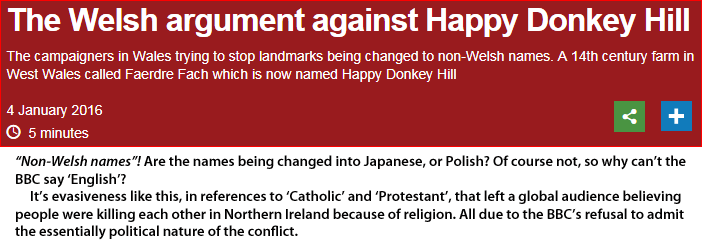


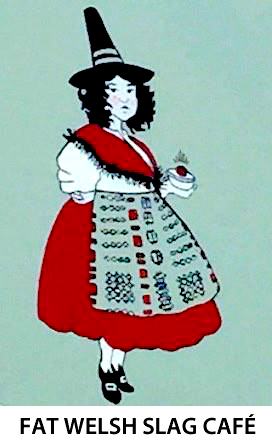
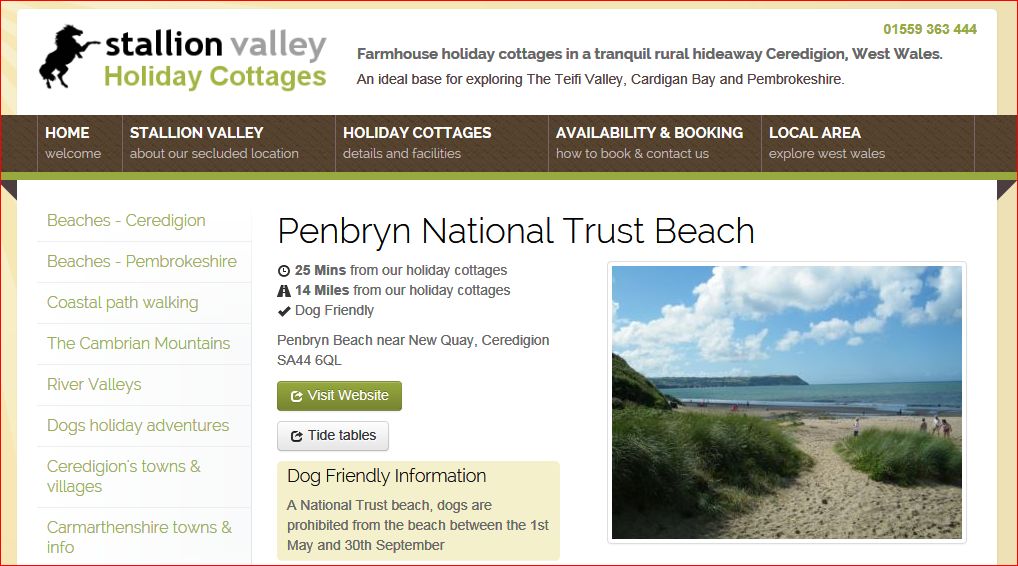




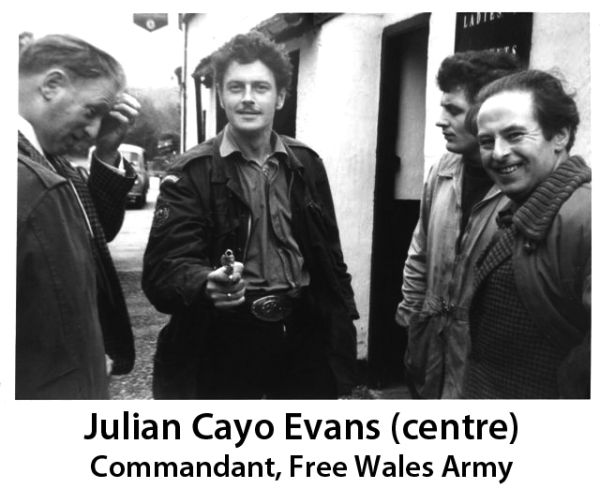
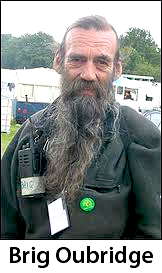


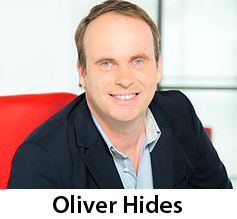 ble here
ble here